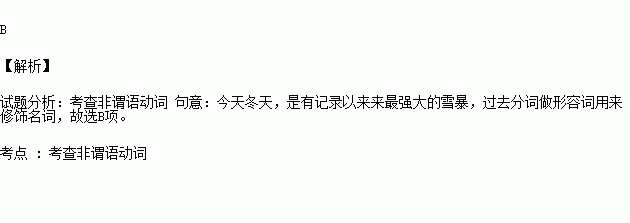题目内容
This winter, one of the largest ______ snowstorms hit many areas.
A. recordingB. recorded
C. being recordedD. to record
There are some strange driving laws in different countries.
Countries | Laws |
Vietnam | If you’re in Vietnam without a Vietnamese driver’s license, you risk a prison sentence of up to three years. |
Russia | In Moscow, if your car is dirty enough to draw dust art, you will be fined about 2,000 rubles (about US 55 dollars). Worse yet, it’s illegal to wash your car by hand in public places – forcing you to take it to one of the few car wash facilities. |
Thailand | Drivers – male or female – can’t drive shirtless whether it’s a car, bus, or a tuk-tuk cab. |
France | France requires its drivers to carry a portable breathalyzer(便携式酒精测量仪) at all times when driving a car. The one-time breathalyzer cost around US 5 dollars, and if you don’t have one, you will be fined US 15 dollars. |
Cyprus | Raising your hands in the car can get you fined of US 35 dollars. The law states a driver can be fined if the person “is in an irregular position inside the car or raises his hand from the steering wheel unnecessarily.” |
Japan | Politeness isn’t just the culture in Japan; it is part of driving laws. Splashing(飞溅) a person by driving through a puddle(水坑) with your car will cost you over US 60 dollars. The country is also strict with its DUI (酒驾) laws – riding with or lending your car to a driver who gets caught drinking and driving can lead to a fine costing thousands of dollars. |
1.Where should you go to wash your car when you are in Moscow?
A. The forest. B. Any public place.
C. Your home. D. The car wash facilities.
2.What can you get fined for in Cyprus?
A. Forgetting to carry a portable breathalyzer.
B. Not having a Cyprus driver’s license.
C. Putting your hands above your head.
D. Driving without a shirt.
3.If you are fined thousands of dollars in Japan, you may have been ________________.
thousands of dollars in Japan, you may have been ________________.
A. sitting in a car with a drunk driver
B. in an irregular position in your car
C. splashing a person with mud
D. impolite to other drivers
4.This passage can most likely be found in __________.
A. a law document
B. a book on interesting cultures
C. an international newspaper
D. a fashion magazine

